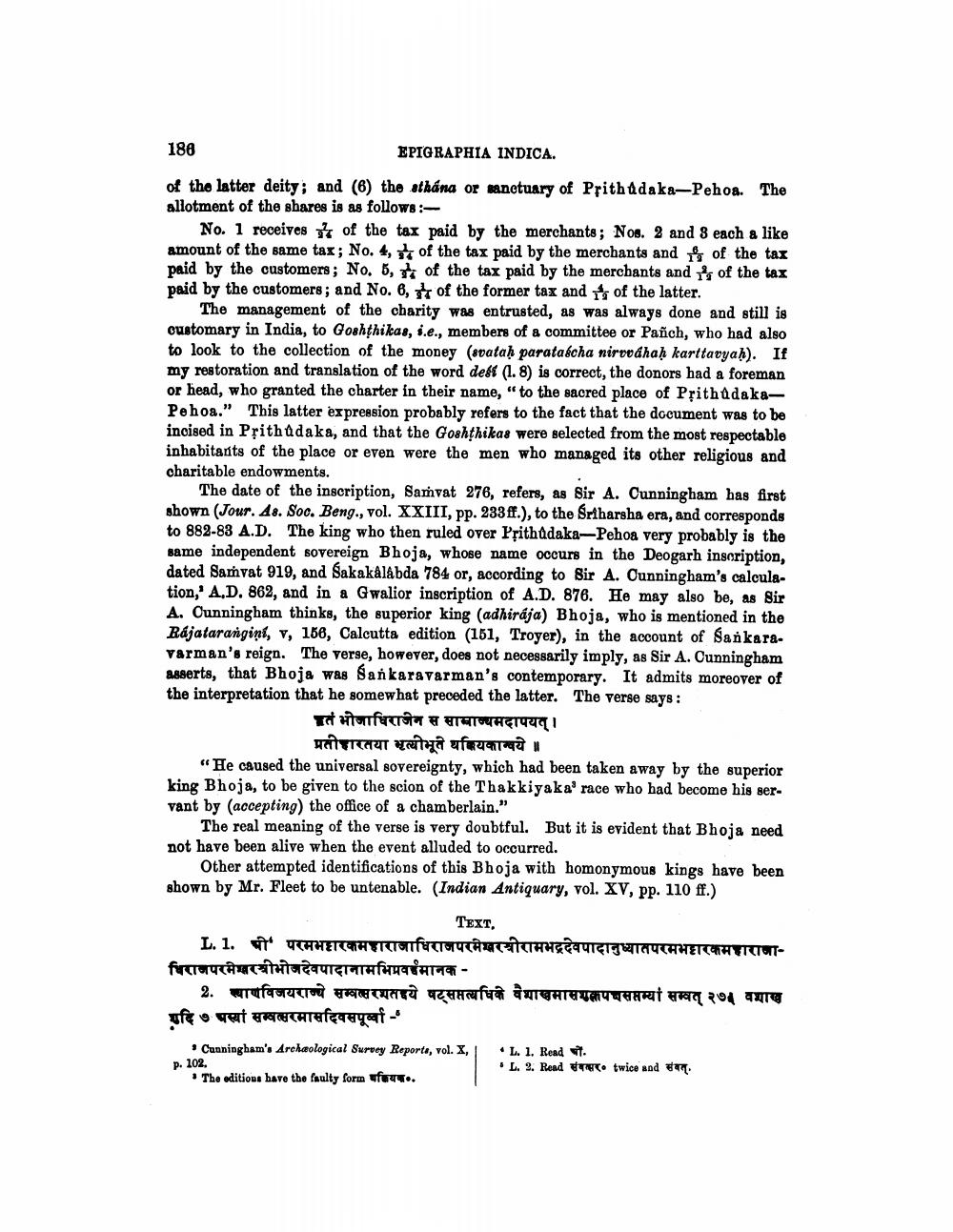________________
188
EPIGRAPHIA INDICA.
of the latter deity; and (6) the sthána or sanctuary of Prithadaka-Pehoa. The allotment of the shares is as follows:
No. 1 receives of the tax paid by the merchants; Nos. 2 and 8 each a like amount of the same tax; No. 4, of the tax paid by the merchants and of the tax paid by the customers; No. 5, of the tax paid by the merchants and of the tax paid by the customers; and No. 6, of the former tax and of the latter.
The management of the charity was entrusted, as was always done and still is customary in India, to Goshthikas, i.e., members of a committee or Pañch, who had also to look to the collection of the money (svataḥ paratascha nirvváhaḥ karttavyaḥ). If my restoration and translation of the word dest (1.8) is correct, the donors had a foreman or head, who granted the charter in their name, "to the sacred place of PrithadakaPehoa." This latter expression probably refers to the fact that the document was to be incised in Prithûdaka, and that the Goshthikas were selected from the most respectable inhabitants of the place or even were the men who managed its other religious and charitable endowments.
The date of the inscription, Samvat 276, refers, as Sir A. Cunningham has first shown (Jour. As. Soc. Beng., vol. XXIII, pp. 233 ff.), to the Sriharsha era, and corresponds to 882-83 A.D. The king who then ruled over Prithûdaka-Pehoa very probably is the same independent sovereign Bhoja, whose name occurs in the Deogarh inscription, dated Samvat 919, and Sakakâlâbda 784 or, according to Sir A. Cunningham's calculation,' A.D. 862, and in a Gwalior inscription of A.D. 876. He may also be, as Sir A. Cunningham thinks, the superior king (adhirája) Bhoja, who is mentioned in the Bájatarangini, v, 156, Calcutta edition (151, Troyer), in the account of Sankaravarman's reign. The verse, however, does not necessarily imply, as Sir A. Cunningham asserts, that Bhoja was Sankaravarman's contemporary. It admits moreover of the interpretation that he somewhat preceded the latter. The verse says:
तं भोजाधिराजेन स साम्बाव्यमदापयत् । प्रतीचारतया भूर्त क्रियान्यये ॥
"He caused the universal sovereignty, which had been taken away by the superior king Bhoja, to be given to the scion of the Thakkiyaka' race who had become his servant by (accepting) the office of a chamberlain."
The real meaning of the verse is very doubtful. But it is evident that Bhoja need not have been alive when the event alluded to occurred.
Other attempted identifications of this Bhoja with homonymous kings have been shown by Mr. Fleet to be untenable. (Indian Antiquary, vol. XV, pp. 110 ff.)
TEXT.
I. 1. श्री परमभट्टारकमहाराजाधिराजपरमेश्वर श्रीरामभद्रदेवपादानुध्यातपरमभट्टारकमहाराजा
धिराजपरमेश्वरश्रीभोजदेवपादानामभिप्रवर्द्धमानक -
2.
विजयराज्ये सम्यरये पदमत्यधिये वैद्याचमाचयपचसय सम्बत् २०५ वाच afe at www.crafewayut →
Cunningham's Archæological Survey Reports, vol. X,
p. 102.
• The editions have the faulty form बक्क्रियक०.
L. 1. Read .
• L. 2. Read संगकार twice and संवत्.




